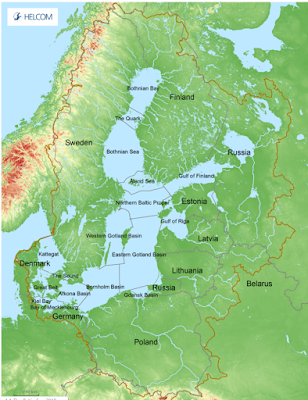In eTwinning we have common objectives based on shared values to promote sustainable development and lifestyles and to nourish intercultural learning and appreciation of cultural diversity and heritage. These goals are global, but, from our perspective, they're especially acute in the Baltic Sea area.
 |
| Kuvan lähde: http://stateofthebalticsea.helcom.fi/in-brief/our-baltic-sea/ |
The Baltic Sea has connected countries and peoples around it for centuries. Its well-being is vital for the prosperity of its whole catchment area consisting of Finland, Sweden, Denmark, Germany, Poland, Latvia, Lithuania, Estonia and Russia. These countries have a long and fruitful history of cultural exchange and trading, but also of war and disputes.
As we all know, the Baltic Sea is currently under serious environmental pressures. Much is being done by several project groups and foundations, two of which are John Nurminen Foundation and Baltic Sea Action Group.
As eTwinners, what can we do to enhance the protection and conservation of the Baltic Sea and to increase intercultural understanding and reciprocal respect in its surrounding countries?
Environmental approach
As a result of the large and heavily populated catchment area and the shallowness of the sea the Baltic Sea is very vulnerable. Large areas in the sea bottom are dead due to poor oxygen conditions.
In addition, climate change will have numerous effects on the condition of the Baltic Sea. A few effects of climate change on biodiversity and the function of ecosystem can already be observed. This is why fighting climate change is an essential part in ensuring the future well-being of the Baltic Sea.
In collaborative eTwinning projects, we can study and learn about climate change and share ideas and find ways to reduce our carbon footprints. We can also act against climate change by taking part in climate strikes, organizing action weeks and designing posters and banderols together across borders.
Cross-cultural approach
To be able to learn and work together, it’s important that we learn to appreciate our cultural diversity and heritage in the countries surrounding Baltic Sea. One way to start is to learn about UNESCO world heritage sites in these countries.
Even more interesting would be to discuss the “intangible” living cultural heritage. In Finland we often feel that going to sauna is very important element in Finnish everyday life and thus our living cultural heritage. Similar cultural habits probably exist in many countries. Each project partner could present examples of their most interesting and peculiar cultural heritage. And, even further, students could create living cultural heritage themselves.
Students could also gather "a box of culture” by bringing different small objects that, for them, represent their culture. They should explain shortly the reason for choosing that particular object. It would be interesting to compare the contents of the boxes and the items in them.
Living heritage in UNESCO website: https://ich.unesco.org/
Social and historical approach
The history of the Baltic Sea can be approached from the points of view of war or trade. It still is an area with lots of tensions due to its strategic situation. But it’s also a busy sea with lots of maritime transport, shipping, cruising and recreational boating.
In eTwinning, historical and social themes have not been the most popular ones, especially as they can raise bitter memories and open wounds that have never really healed. However, for students aged 13 or more, it would be very educational to learn how differently we can interpret historical facts depending on the perspective we take.
Is this generation ready to reach reconciliation and be the one that will unconditionally promote culture of peace and non-violence.
Activities to get started with
Save the Baltic Sea by gaming: http://www.splashgame.fi/fi-FI/
What is your Baltic Sea footprint? Test your footprint with HS’s Baltic Sea calculator
Make a climate change action plan
Make a commitment, commitments create change: Commitment2050
Take part in the Baltic Sea Day. It will be celebrated on August 27th 2020.
Take part in international eTwinning seminar dealing with the Baltic Sea in Helsinki 24 - 26 September 2020



Ei kommentteja:
Lähetä kommentti